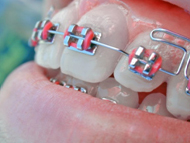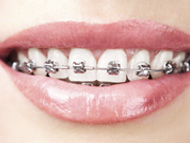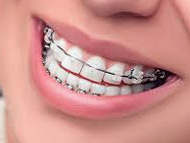
What is orthodontics?
Orthodontics is the dental specialty that focuses on the development, prevention, and correction of irregularities of the teeth, bite and jaws. Orthodontists also have specialized training in facial abnormalities and disorders of the jaw. A patient may consult an orthodontist after receiving a referral from his or her general dentist - recommending orthodontic treatment to improve the patient's physical "orofacial" appearance. However, it is recommended that every child receive an orthodontic evaluation by the age of seven.
Why choose orthodontic treatment?
Any orthodontic problem may be classified as a malocclusion, or "bad bite." The following problems may be helped or minimized with proper orthodontic treatment:
- Misaligned, crooked or crowed teeth.
- Missing teeth.
- Extra teeth.
- An overbite.
- An underbite.
- An openbite.
- Misaligned or incorrect jaw position.
- A disorder of the jaw joint.
At what age do braces become appropriate?
Moving and correcting the alignment of the teeth follows the same biological and physical process no matter what the age. However, an adult mouth must overcome already positioned facial bones and jaw structure. Thus, overcoming most types of malocclusions may require more than one type of orthodontic treatment for adults. In most cases, the ideal age for braces and other orthodontic treatments is between 10 and 14 years of age, although people of any age can benefit from treatment.
What are the different types of braces available?



Braces, also called fixed orthodontic appliances, generally come in three varieties
- Brackets, metal or plastic, clear or tooth-colored, that are bonded to teeth.
- Lingual-type brackets that attach to the back of teeth, hidden from view.
- Aligners - Transparent.
Oral healthcare and braces
The following recommendations will help to eliminate or reduce, any oral health problems while your teeth are in braces:
- Brush your teeth carefully after every meal with fluoride toothpaste and a soft-bristled toothbrush as food becomes easily lodged in the braces. A new toothbrush may be needed every three to four months or sooner if bristles are broken or frayed. A worn toothbrush doesn't do a good job of cleaning the teeth.
- Floss daily between the teeth and the braces.
- See an oral health professional for cleanings every six months.
- Limit your sugar and starch intake as debris left behind from these types of foods may turn into damaging acids, which in addition to promoting plaque formation, may also be harmful to teeth and gums.
- Avoid hard and/or sticky snacks that may be difficult to remove from the orthodontic equipment in your mouth. This includes hard foods such as popcorn, hard candy, nuts and ice chips and sticky foods like chewing gum, caramel and other chewy candy.